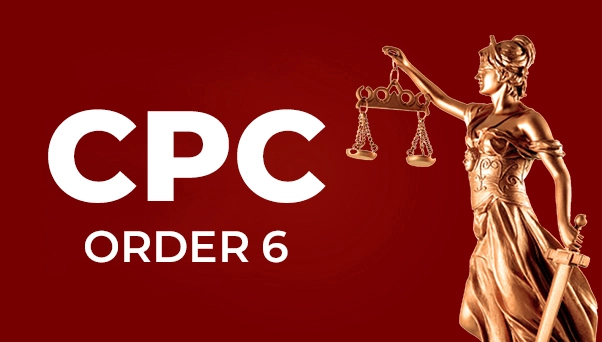Title: Understanding CPC Order 6: A Comprehensive Overview
One important rule is CPC Order 6. It deals with how to start a legal case. To start a case, you need special papers. CPC Order 6 tells you how to get and deliver those papers. In this article, we'll look at CPC Order 6. We'll see what it does. We'll learn about its key parts. And well understand how it works in real life.
What is CPC Order 6?
CPC Order 6 is a part of the Civil Procedure Code. This order explains the rules for starting a civil case in court. It includes instructions for issuing and serving court documents. These documents are summons, writs, notices, and other judicial communications. CPC Order 6 guides people involved in a civil case through the early stages. It helps litigants, lawyers, and judicial officers know what to do.
Key Provisions of CPC Order 6:
1. Issuance of Summons/Writs:
CPC Order 6 is important for starting legal cases. Summons or writs tell the defendant about the case. The defendant has to come to court. These papers let the defendant know about the legal action against them. They summon the defendant to appear in court.
2. Contents of Summons/Writs:
CPC Order 6 lays down the key things that must be in summons or writs. These include: the names, addresses of parties involved, claim or relief sought details, date, time, and place for the court hearing, and any other important specifics.
3. Modes of Service:
CPC Order 6 is vital because it explains how legal papers get delivered. Papers like summons or writs can reach people through different ways. Personal service means handing them directly. Substituted service allows leaving it at their home or office. Service by post allows mailing it.
4. Timeframe for Service:
The order sets time limits. Documents must reach parties quickly. Following these timelines is vital. It keeps the legal process moving efficiently. It upholds fair procedures.
5. Proof of Service:
CPC Order 6 instructs parties to give evidence of delivery to the court. This proves the intended people received the required papers. Proof might be an affidavit or certificate of service. The jurisdiction's rules decide what is needed.
Practical Implications and Considerations:
CPC Order 6 sets procedures for lawsuits. Not following these rules is risky. Delays could happen. Opponents may object. In some cases, the case itself could be dismissed. So, understanding Order 6 is crucial for everyone involved in a civil case.
Additionally, Order 6 upholds due process and fairness. It provides clear instructions on serving legal documents. These guidelines protect rights. They promote efficient justice administration. Following Order 6 helps ensure a smooth legal process for all parties.
Lawyers should follow the rules in CPC Order 6 carefully when starting or answering a case. Following these rules closely helps avoid mistakes and makes the legal process smoother. Disputes can be settled fairly and quickly this way.
Conclusion:
CPC Order 6 is a key part of civil laws. It tells the rules for starting cases in court. This order makes things clear. It helps cases run smoothly and fairly.
